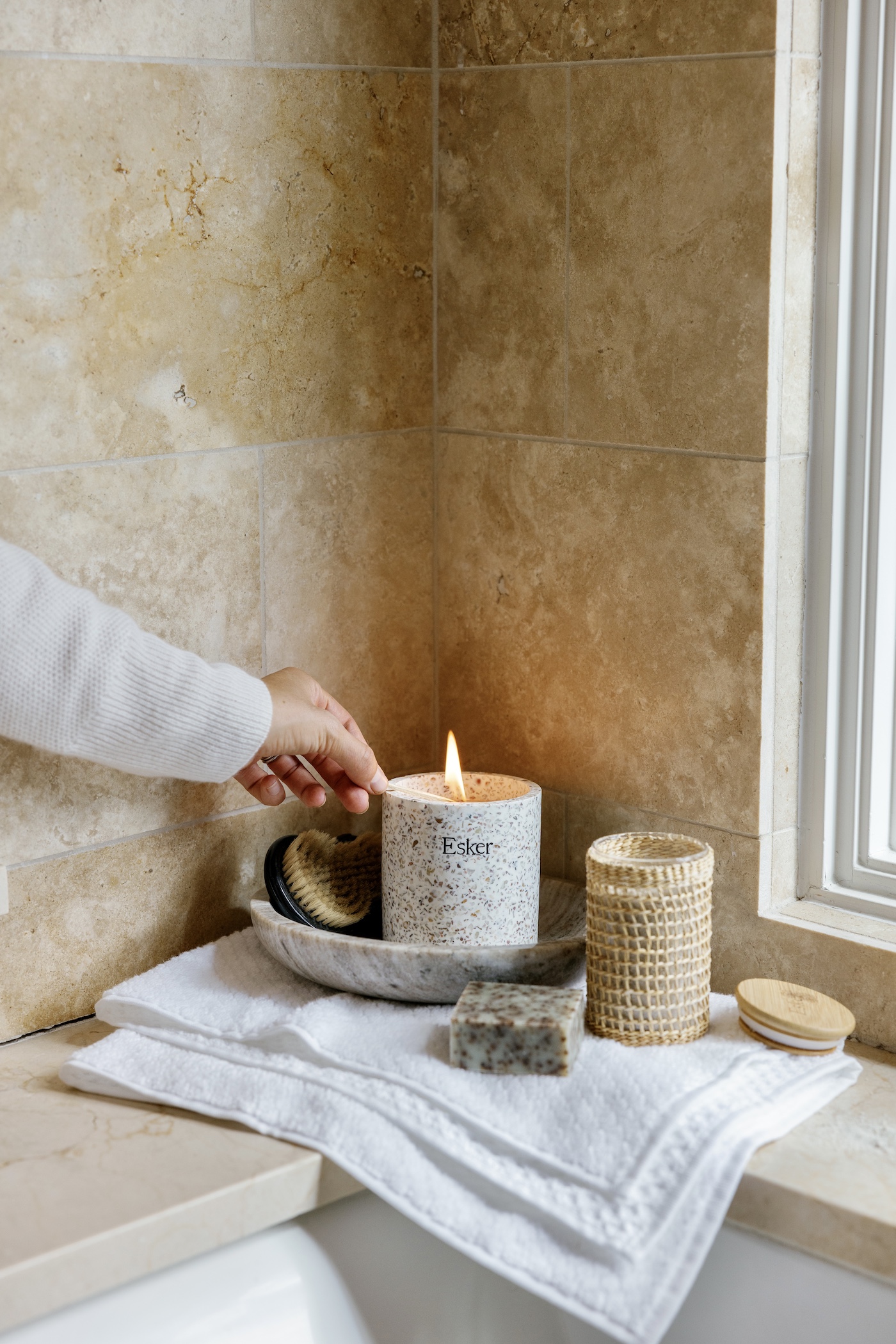
We’ve all been there—the new year hits, and we dive in with excitement to finally get after that big goal we’ve been dreaming of. Or to kick the bad habit that we know is holding us back. That first week in January, we’re carried through by adrenaline and it feels great. But by week two? The novelty begins to wear off, and our willpower is already slipping. It’s this discouraging cycle that’s given New Year’s resolutions a bad rap over the last few years. And it’s why many people have given up on trying to set them—they never seem to “stick.” But whether you use the term “resolution” or not, there’s a science behind how to achieve goals that actually change your life.
This time, picture yourself setting a goal that continues to inspire you over the course of the entire year—one that you make actual progress on over time, giving you a deep sense of satisfaction. Over the last decade, I’ve learned there’s a strategy and a method for how to achieve goals that do just that, and I truly love this season as an opportunity to set my vision for the year ahead and map out how I’m going to get there.

Subscribe
Free Vision Workbook
Make it happen. This resource will help you intentionally set (and realize) goals to live out your purpose.
Thanks for Signing Up!
Oops!
Looks like you’re already signed up or your email address is invalid.
Oops!
Looks like you unsubscribed before click here to resubscribe.
Know Your Vision
In order to properly set goals, you have to first know where you’re headed. Enter my 2023 Vision Workbook, a tool I created for myself a few years ago to help me set priorities in my life, then make real traction on my goals in an achievable way. (If you don’t have your copy yet, you can download it for free right here!) Last week, I shared how I use the Workbook to create a vision for my year by walking through nine thought-provoking questions. If you missed that post, I’d highly recommend starting there, as it lays the foundation for today’s topic: how to set goals that are aligned with your personal vision.
Once you’ve visualized the outcomes you want to create, you can roadmap the transformative steps that will make that dream a reality this year. But first, let’s talk about what makes a good goal.
Understand How to Set Goals You Can Stick To
Often, we think about the goals we want to achieve, but we lack the strategy for making them stick. You’ve probably heard of the “S.M.A.R.T. Goals” framework, which is an acronym that stands for: specific, measurable, achievable, realistic, and time-bound. The idea is that using this checklist will transform your vague goals into something you can actually achieve. This has been a helpful way for me to think about goal-setting, but over the years I’ve personalized it so that it fits better within my own life. Now when I set a goal, I make sure that it checks the following boxes:
Focused
I set ONE goal for each area of my life at a time. Each of these goals has ONE action step that I’m most focused on.
Systematized
I create a system for how exactly I’m going to get there, in a way that fits my life, schedule, and unique circumstances.
Holistic
Since I want to continue growing in all the different areas of my life, my goals should reflect that.
Focus On One Goal at a Time
Have you ever started the new year with a long list of goals, only to become so overwhelmed that you kicked them all to the curb by February? Same. Believe it or not, our minds can only effectively focus on one goal at a time, thanks to an idea called Goal Competition. James Clear describes the phenomenon of “goal competition” like this:
Goal competition says that one of the greatest barriers to achieving your goals is the other goals you have. In other words, your goals are competing with one another for your time and attention. Whenever you chase a new goal, you have to pull focus and energy from your other pursuits.
Yes, we’re setting goals for different areas of our lives, but for each of those areas we’re forcing ourselves to prune our list of goals down to the ONE goal that’s most important to us.
Create a System
When it comes to setting new goals, I like an action plan that seamlessly fits into my life, also known as systematizing that goal. Let me explain.
The Difference Between Goals and Systems
A goal is our desired end point. A system is the framework, or execution strategy, you put into place to help you make actual progress on your goals. For instance, if your goal is to start journaling every morning, your system is determining when, where, and how you’re going to be consistent with this practice over the long-term. If your goal is to make more dinners at home this year, your system will include when and how you’ll plan your meals and shop for groceries.
Focus on the One Most Impactful Action Step
After I’ve determined my one goal, I narrow down the one most important action step that will move the needle most powerfully toward achieving that goal. This sounds like a small thing, but it’s been so impactful in my own life. For example, in 2020, my career goal was to increase our website traffic. There are so many different small things we could do to help increase readership, but I knew that if I put all my energy towards growing our email list, we’d see a direct result. So that’s where I put my focus.
For any of your goals, just ask yourself: what would be the ONE most powerful action step I could take to make traction on this goal? Write it down, and know where to focus your energy.
Implement Habit Stacking
This is a specific type of system that helps you integrate new habits and practices into your daily schedule. I often habit stack my one action item to ensure it becomes a regular part of my life.
Here’s what habit stacking is: first, you identify a current habit you already do each day. Then, you stack your new behavior on top. I first learned this practice from James Clear, who explains it this way:
“The habit stacking formula is:
After/Before [CURRENT HABIT], I will [NEW HABIT].
For example:
- After I pour my cup of coffee each morning, I will meditate for one minute.
- After I take off my work shoes, I will immediately change into my workout clothes.
- After I sit down to dinner, I will say one thing I’m grateful for that happened today.
- After I get into bed at night, I will give my partner a kiss.
By linking your new habits to a cycle that is already built into your brain, you make it more likely that you’ll stick to the new behavior.“
Take a Holistic Approach
If you’re a reader of this site, there’s a high likelihood that you share our desire to build a life based on a holistic approach to wellness—one that encompasses our emotional health as much as our physical well-being, and our relationships as much as our careers or ambitions. So often, goal-setting is solely focused on achievements, but what about all the other important parts of you? Creating your dream life isn’t just about achieving success—perhaps even more key to your long-term happiness are your relationships and wellness. My goal-setting practice takes this approach, asking you to set your own most important goal in each of four areas:
Relationship Goals
Relationship goals could focus on romantic relationships, ways you want to show up for your kids or extended family members, or perhaps you want to create new friendships this year.
Career Goals
Your career goal might focus on your current job, or something new you want to move into this year. It could be a creative pursuit or side hustle, or maybe it’s even a financial goal you want to bring to fruition.
Health Goals
A health goal might be about physical health (nutrition, exercise, healthy habits) or it might focus on your emotional health.
Personal Growth Goals
How do you want to grow as a person this year? Your personal growth goal might include something new you want to learn this year, a hobby you’d like to try, or simply a practice like journaling or meditation that will help you grow more into your best self.
We want to keep growing and developing in all these different parts of ourselves—but get really specific on how we’re going to do it!
***
As you review how to achieve goals in each area of your life this year, celebrate! You’ve taken a major step in designing your dream life this year, and you should be so proud of what you’ve created. If you haven’t yet grabbed your own copy of the workbook, access it right here. Next week I’ll be sharing what my exact daily and monthly practice looks like as I integrate my goal systems into my life.









